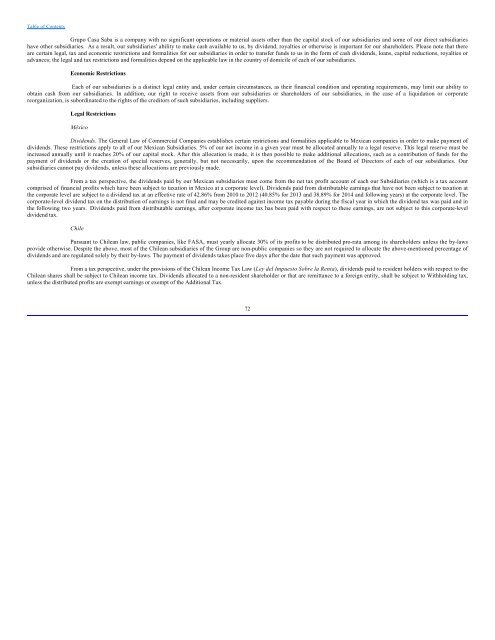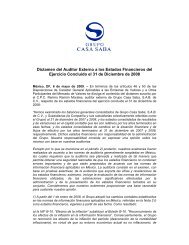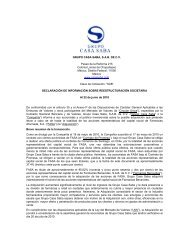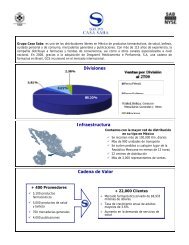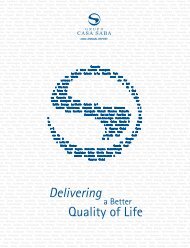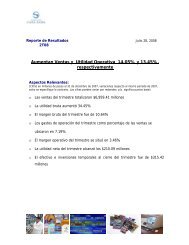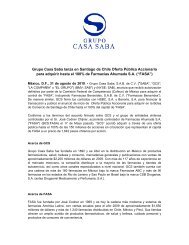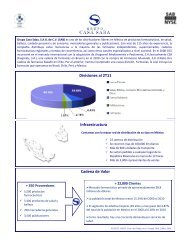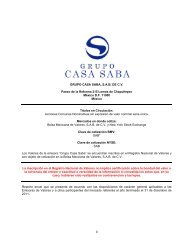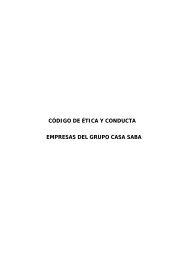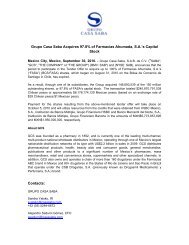FORM 20-F Grupo Casa Saba, S.A.B. de C.V.
FORM 20-F Grupo Casa Saba, S.A.B. de C.V.
FORM 20-F Grupo Casa Saba, S.A.B. de C.V.
Create successful ePaper yourself
Turn your PDF publications into a flip-book with our unique Google optimized e-Paper software.
Table of Contents<br />
<strong>Grupo</strong> <strong>Casa</strong> <strong>Saba</strong> is a company with no significant operations or material assets other than the capital stock of our subsidiaries and some of our direct subsidiaries<br />
have other subsidiaries. As a result, our subsidiaries’ ability to make cash available to us, by divi<strong>de</strong>nd, royalties or otherwise is important for our sharehol<strong>de</strong>rs. Please note that there<br />
are certain legal, tax and economic restrictions and formalities for our subsidiaries in or<strong>de</strong>r to transfer funds to us in the form of cash divi<strong>de</strong>nds, loans, capital reductions, royalties or<br />
advances; the legal and tax restrictions and formalities <strong>de</strong>pend on the applicable law in the country of domicile of each of our subsidiaries.<br />
Economic Restrictions<br />
Each of our subsidiaries is a distinct legal entity and, un<strong>de</strong>r certain circumstances, as their financial condition and operating requirements, may limit our ability to<br />
obtain cash from our subsidiaries. In addition, our right to receive assets from our subsidiaries or sharehol<strong>de</strong>rs of our subsidiaries, in the case of a liquidation or corporate<br />
reorganization, is subordinated to the rights of the creditors of such subsidiaries, including suppliers.<br />
Legal Restrictions<br />
México<br />
Divi<strong>de</strong>nds. The General Law of Commercial Companies establishes certain restrictions and formalities applicable to Mexican companies in or<strong>de</strong>r to make payment of<br />
divi<strong>de</strong>nds. These restrictions apply to all of our Mexican Subsidiaries. 5% of our net income in a given year must be allocated annually to a legal reserve. This legal reserve must be<br />
increased annually until it reaches <strong>20</strong>% of our capital stock. After this allocation is ma<strong>de</strong>, it is then possible to make additional allocations, such as a contribution of funds for the<br />
payment of divi<strong>de</strong>nds or the creation of special reserves, generally, but not necessarily, upon the recommendation of the Board of Directors of each of our subsidiaries. Our<br />
subsidiaries cannot pay divi<strong>de</strong>nds, unless these allocations are previously ma<strong>de</strong>.<br />
From a tax perspective, the divi<strong>de</strong>nds paid by our Mexican subsidiaries must come from the net tax profit account of each our Subsidiaries (which is a tax account<br />
comprised of financial profits which have been subject to taxation in Mexico at a corporate level). Divi<strong>de</strong>nds paid from distributable earnings that have not been subject to taxation at<br />
the corporate level are subject to a divi<strong>de</strong>nd tax at an effective rate of 42.86% from <strong>20</strong>10 to <strong>20</strong>12 (40.85% for <strong>20</strong>13 and 38.89% for <strong>20</strong>14 and following years) at the corporate level. The<br />
corporate-level divi<strong>de</strong>nd tax on the distribution of earnings is not final and may be credited against income tax payable during the fiscal year in which the divi<strong>de</strong>nd tax was paid and in<br />
the following two years. Divi<strong>de</strong>nds paid from distributable earnings, after corporate income tax has been paid with respect to these earnings, are not subject to this corporate-level<br />
divi<strong>de</strong>nd tax.<br />
Chile<br />
Pursuant to Chilean law, public companies, like FASA, must yearly allocate 30% of its profits to be distributed pro-rata among its sharehol<strong>de</strong>rs unless the by-laws<br />
provi<strong>de</strong> otherwise. Despite the above, most of the Chilean subsidiaries of the Group are non-public companies so they are not required to allocate the above-mentioned percentage of<br />
divi<strong>de</strong>nds and are regulated solely by their by-laws. The payment of divi<strong>de</strong>nds takes place five days after the date that such payment was approved.<br />
From a tax perspective, un<strong>de</strong>r the provisions of the Chilean Income Tax Law (Ley <strong>de</strong>l Impuesto Sobre la Renta), divi<strong>de</strong>nds paid to resi<strong>de</strong>nt hol<strong>de</strong>rs with respect to the<br />
Chilean shares shall be subject to Chilean income tax. Divi<strong>de</strong>nds allocated to a non-resi<strong>de</strong>nt sharehol<strong>de</strong>r or that are remittance to a foreign entity, shall be subject to Withholding tax,<br />
unless the distributed profits are exempt earnings or exempt of the Additional Tax.<br />
72


